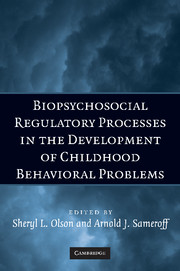Book contents
- Frontmatter
- Contents
- Preface
- Contributors
- 1 Conceptual Issues in Studying the Development of Self-Regulation
- 2 How Gene-Environment Interactions Can Influence the Development of Emotion Regulation in Rhesus Monkeys
- 3 Context Matters: Exploring Definitions of a Poorly Modulated Stress Response
- 4 An Integrative Approach to the Neurophysiology of Emotion Regulation: The Case of Social Withdrawal
- 5 Regulatory Competence and Early Disruptive Behavior Problems: The Role of Physiological Regulation
- 6 Behavior Regulation as a Product of Temperament and Environment
- 7 Self-Regulatory Processes in the Development of Disruptive Behavior Problems: The Preschool-to-School Transition
- 8 Emotional Dysregulation and the Development of Serious Misconduct
- 9 Regulatory Processes in Children's Coping with Exposure to Marital Conflict
- 10 Family Subsystems and Children's Self-Regulation
- 11 Culture and the Development of Regulatory Competence: Chinese–U.S. Comparisons
- 12 Self-Regulation and the Development of Behavioral and Emotional Problems: Toward an Integrative Conceptual and Translational Research Agenda
- Index
- References
12 - Self-Regulation and the Development of Behavioral and Emotional Problems: Toward an Integrative Conceptual and Translational Research Agenda
Published online by Cambridge University Press: 02 July 2009
- Frontmatter
- Contents
- Preface
- Contributors
- 1 Conceptual Issues in Studying the Development of Self-Regulation
- 2 How Gene-Environment Interactions Can Influence the Development of Emotion Regulation in Rhesus Monkeys
- 3 Context Matters: Exploring Definitions of a Poorly Modulated Stress Response
- 4 An Integrative Approach to the Neurophysiology of Emotion Regulation: The Case of Social Withdrawal
- 5 Regulatory Competence and Early Disruptive Behavior Problems: The Role of Physiological Regulation
- 6 Behavior Regulation as a Product of Temperament and Environment
- 7 Self-Regulatory Processes in the Development of Disruptive Behavior Problems: The Preschool-to-School Transition
- 8 Emotional Dysregulation and the Development of Serious Misconduct
- 9 Regulatory Processes in Children's Coping with Exposure to Marital Conflict
- 10 Family Subsystems and Children's Self-Regulation
- 11 Culture and the Development of Regulatory Competence: Chinese–U.S. Comparisons
- 12 Self-Regulation and the Development of Behavioral and Emotional Problems: Toward an Integrative Conceptual and Translational Research Agenda
- Index
- References
Summary
Within the field of developmental psychopathology, there is growing interest in research examining the development of self-regulatory processes and its relevance to understanding the emergence of clinically significant problems with behavior or emotion. Earlier chapters in this book present current conceptual approaches and sets of empirical findings that address these issues. In this chapter, we discuss this exciting and rapidly advancing area of research with a primary goal of considering points of integration across some of the main themes described in the previous chapters; we also present some thoughts about key directions for future research.
Specifically, in this chapter we address the following four areas: (1) definitional and conceptual issues that underscore the construct of self-regulation as a set of complex multifaceted processes, (2) the importance of contextual effects in shaping these processes throughout development, (3) the ways in which failures in the development of self-regulatory competencies may lead to clinically significant problems, and (4) one example of a developmental nexus of regulatory interactions during adolescence – self-regulation in the context of pubertal maturation, sleep, emotion, and cognition. We believe that this example helps illustrate some key principles, including the potential value of a neurobehavioral framework for understanding some aspects of self-regulation, as well as some implications for translational research on the development of self-regulatory processes.
INTRODUCTION: SELF-REGULATION AS A COMPLEX, MULTIFACETED PROCESS
We begin this chapter by considering conceptual issues regarding the construct of self-regulation.
Information
- Type
- Chapter
- Information
- Biopsychosocial Regulatory Processes in the Development of Childhood Behavioral Problems , pp. 290 - 318Publisher: Cambridge University PressPrint publication year: 2009
References
Accessibility standard: Unknown
- 3
- Cited by
